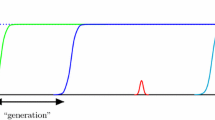Abstract
This paper proposes a novel asynchronous reference-based evaluation (named as ARE) for an asynchronous EA that evolves individuals independently unlike general EAs that evolve all individuals at the same time. ARE is designed for an asynchronous evolution by tertiary parent selection and its archive. In particular, ARE asynchronously evolves individuals through a comparison with only three of individuals (i.e., two parents and one reference individual as the tertiary parent). In addition, ARE builds an archive of good reference individuals. This differ from synchronous evolution in EAs in which selection involves comparison with all population members. In this paper, we investigate the effectiveness of ARE, by applying it to some standard problems used in Linear GP that aim being to minimize the execution step of machine-code programs. We compare GP using ARE (ARE-GP) with steady state (synchronous) GP (SSGP) and our previous asynchronous GP (Tierra-based Asynchronous GP: TAGP). The experimental results have revealed that ARE-GP not only asynchronously evolves the machine-code programs, but also outperforms SSGP and TAGP in all test problems.
Access this chapter
Tax calculation will be finalised at checkout
Purchases are for personal use only
Preview
Unable to display preview. Download preview PDF.
Similar content being viewed by others
References
Goldberg, D.E.: Genetic Algorithms in Search, Optimization and Machine Learning, 1st edn. Addison-Wesley Longman Publishing Co., Inc., Boston (1989)
Koza, J.: Genetic Programming On the Programming of Computers by Means of Natural Selection. MIT Press (1992)
Lewis, A., Mostaghim, S., Scriven, I.: Asynchronous multi-objective optimisation in unreliable distributed environments. In: Lewis, A., Mostaghim, S., Randall, M. (eds.) Biologically-Inspired Optimisation Methods. SCI, vol. 210, pp. 51–78. Springer, Heidelberg (2009)
Glasmachers, T.: A natural evolution strategy with asynchronous strategy updates. In: Proceeding of the Fifteenth Annual Conference on Genetic and Evolutionary Computation Conference, GECCO 2013, pp. 431–438. ACM, New York (2013)
Harada, T., Takadama, K.: Asynchronous evaluation based genetic programming: Comparison of asynchronous and synchronous evaluation and its analysis. In: Krawiec, K., Moraglio, A., Hu, T., Etaner-Uyar, A.Ş., Hu, B. (eds.) EuroGP 2013. LNCS, vol. 7831, pp. 241–252. Springer, Heidelberg (2013)
Ray, T.S.: An approach to the synthesis of life. Artificial Life II XI, 371–408 (1991)
Reynolds, C.W.: An evolved, vision-based behavioral model of coordinated group motion. In: Proc. 2nd International Conf. on Simulation of Adaptive Behavior, pp. 384–392. MIT Press (1993)
Banzhaf, W., Francone, F.D., Keller, R.E., Nordin, P.: Genetic programming: an introduction: on the automatic evolution of computer programs and its applications. Morgan Kaufmann Publishers Inc., San Francisco (1998)
Brameier, M.F., Banzhaf, W.: Linear Genetic Programming, vol. 117. Springer (2007)
Microchip Technology Inc.: PIC10F200/202/204/206 Data Sheet 6-Pin, 8-bit Flash Microcontrollers. Microchip Technology Inc. (2007)
Author information
Authors and Affiliations
Editor information
Editors and Affiliations
Rights and permissions
Copyright information
© 2014 Springer-Verlag Berlin Heidelberg
About this paper
Cite this paper
Harada, T., Takadama, K. (2014). Asynchronous Evolution by Reference-Based Evaluation: Tertiary Parent Selection and Its Archive. In: Nicolau, M., et al. Genetic Programming. EuroGP 2014. Lecture Notes in Computer Science, vol 8599. Springer, Berlin, Heidelberg. https://doi.org/10.1007/978-3-662-44303-3_17
Download citation
DOI: https://doi.org/10.1007/978-3-662-44303-3_17
Publisher Name: Springer, Berlin, Heidelberg
Print ISBN: 978-3-662-44302-6
Online ISBN: 978-3-662-44303-3
eBook Packages: Computer ScienceComputer Science (R0)




